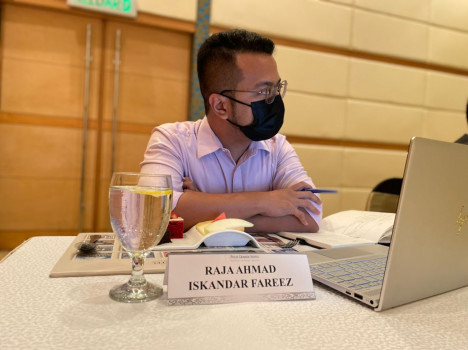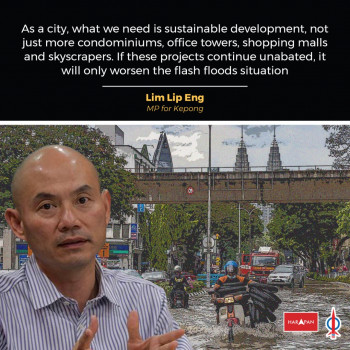by Lee Hwa Beng
In the last general election, the MCA fielded candidates in 40 parliamentary seats but won only 15 and lost the remaining 25 seats to the opposition in the political tsunami. This was by far the worst result ever for the MCA.
Will the MCA be able to retain and perhaps increase the existing 15 seats, or will its position be further weakened?
Two years ago, MCA president Chua Soi Lek announced that the MCA will not accept any Cabinet positions if the party obtains fewer than the existing 15 seats. This statement was made nearly two years ago when he first became MCA president but has not been repeated since.
Was he trying to blackmail the Chinese community into considering carefully before voting against the party? Was he more confident of a better performance then? His subsequent silence may mean he has either regretted his statement or that he is less confident of his party’s performance in the upcoming elections two years later.
According to the chart in this article, out of the 15 seats won by the MCA, only four seats have a majority, i.e. more than 50 per cent of Chinese voters — Kampar, Kluang, Gelang Patah and Kulai. Two other seats have marginally more Chinese than Malay voters i.e. Bentong and Labis. This shows that the MCA won these 15 seats with more support from the Malay community than the Chinese. Furthermore, out of the 15 seats, seven were won from the DAP, six from PKR and two from PAS. Interestingly enough, the other 25 seats where MCA lost were all Chinese plurality seats.
How then will the MCA fare in the 13th general election? Having exited the political arena, I will attempt to answer this objectively in spite of the fact that I was an MCA leader and also a victim of the political tsunami in 2008.
In general, most people think the MCA will obtain fewer than the 15 seats it garnered in 2008. As to the extent of the loss, this will depend on the following crucial factors that will decide the MCA’s fate:
1) The increase of the number of voters in the electoral roll will be a decisive factor. Generally these new additions are young, first-time voters who are anti-establishment and will normally vote against the incumbents. In other words, they will not be voting in favour of the MCA.
2) Out of the 15 seats won by the MCA, seven are located in Johor. Pakatan Rakyat has declared Johor as its frontline battle state in its plan to capture Putrajaya. Hence it will definitely concentrate on the seven MCA seats and also the sole MIC seat (Segamat) in the state. They will also be led by heavyweights like Salahuddin Ayub, one of the three vice-presidents of PAS and current MP for Kubang Kerian, Chua Jui Meng, also a PKR vice-president and former Bakri MP, and very likely Lim Kit Siang himself, who will move from Perak to Johor, the state where he was born. Another DAP central executive committee member and national leader, Liew Ching Tong, has already announced his intention to move from Penang.
3) Will Chor Chee Heung, who won marginally by 184 votes in Alor Star, and Kong Cho Ha with 298 votes be able to retain their seats ? Alor Star and Lumut have many more Malay voters than Chinese. In the last elections slightly more than 50 per cent Malays voted for the MCA/BN across the country. A slight decrease in Malay votes will make these two seats vulnerable. This potential decrease in Malay sentiment for BN will inevitably impact all the seats contested by the MCA that have more than 40 per cent Malay voters as nobody can deny that Chinese support for the MCA and BN is worse now compared to the last elections.
4) Of the 15 incumbents, at least five to eight will either be dropped by the MCA or will retire. Who will be replacing them? Will winnable candidates be fielded or will only the president’s men prevail? Chua Soi Lek has announced that Ong Tee Keat, a winnable candidate and current Pandan MP, will be dropped. Will Najib over-rule Soi Lek and retain Tee Keat? Ong Ka Ting, who won with a majority of 14,895 votes, has declared a few times that he is stepping down from his seat in Kulai. His successor would be hard pressed to retain this 59 per cent Chinese-majority seat. Ong Ka Chuan, Ka Ting’s older brother, will win in Tanjung Malim if he stands again. But will he be retained knowing the bad blood between Soi Lek and the Ong brothers?
5) Will Ng Yen Yen be able to retain her Raub seat after the Bukit Koman cyanide poisoning issue, the Psy “lou sang” incident and “Yes No Yes No” episode in Malacca?
6) How will Liow Tiong Lai fare against Himpunan Hijau’s Wong Tak standing on a DAP ticket? Will the change of candidate from a PKR to DAP one have any effect in this 47 per cent Chinese-majority seat?
7) Will the ongoing PKFZ trial of former MCA president Tun Dr Ling Liong Sik have any effect on all the MCA candidates? In particular, will it impact Kong Cho Ha who replaced Ong Tee Keat as transport minister?
8) Finally the key question: Will Soi Lek stand in this coming elections? If he stands, which seat will he choose? Will his sex scandal affect him only or have repercussions on all the MCA candidates? Without a doubt, all Pakatan candidates who are standing against Soi Lek and other MCA members will liberally remind voters of this sex scandal.
Pakatan knows MCA candidates will be the most vulnerable and hence will capitalise on this in its aim to win the election. They also know the DAP will be their best weapon to take down MCA candidates.
Hence, the Bentong seat that was previously contested by PKR was given to the DAP. Chua Jui Meng’s request to contest in his hometown and previous seat in Bakri when he was still a member of the MCA was also not considered and has been retained as the DAP’s. Lim Kit Siang recently announced Gelang Patah, a Chinese-majority seat, will be contested by the DAP although it was a PKR seat in the last election.
I am convinced that Pakatan will give seats to the DAP in whichever area it has a better chance to win.
In conclusion, while it would not be appropriate for me to pinpoint exactly which seats the MCA will retain or lose, I estimate that MCA will obtain somewhere between 5-10 seats out of these 15 seats.
In my next article, I will look into how the MCA will fare in the 25 seats it lost.
* Datuk Lee Hwa Beng is the former MCA state assemblyman for Subang Jaya (three terms from 1995-2008). Stood as the BN candidate for the Kelana Jaya parliamentary seat in 2008 and lost. Appointed Port Klang Authority chairman to investigate the PKFZ scandal from 2008 to 2011 and the author of “PKFZ: A Nation’s Trust Betrayed.”
* The views expressed in this article are the personal opinion of the columnist and this article first appeared in The Malaysian Insider.




